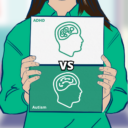Summary – What clinicians need to know The NHS England ADHD Taskforce has released its Interim Report on…
Blog
DSM-5 and ADHD: What changed, what’s missing, and what clinicians must know
The Diagnostic and Statistical Manual of Mental Disorders (DSM) was first introduced in the 1950s. It went through…

What does the gold standard of ADHD diagnosis and treatment look like in 2025 and beyond?
In 2025, the gold standard of ADHD diagnosis and treatment is evolving, shaped by updated DSM-5 criteria, new…

ADHD vs Autism in clinic settings: red flags and co-diagnosis tips
More than half of adults with ADHD also live with another mental health condition, and almost 40%…

How objective ADHD technology is reducing uncertainty and creating efficiency
ADHD is one of the most prevalent neurodevelopmental disorders, but access to timely and efficient treatment continues to…

What is the future of ADHD care? Recap of the 2025 ADHD Expert Consortium meeting
Each year, the ADHD Expert Consortium meets to review progress and identify new strategies to address gaps in…

Helping teachers understand ADHD: A resource toolkit for schools
Supporting students with ADHD is one of the most common yet complex challenges teachers face in today’s classrooms….

Value-based care in ADHD management: Objective testing for improved patient outcomes
The US healthcare system is shifting away from volume-driven visits and tests, and toward value-based care, also…

Why patient developmental history is crucial for an ADHD diagnosis: Key insights from our webinar
ADHD is a neurodevelopmental disorder, meaning symptoms must have been present since childhood (APA, DSM-5). Understanding a patient’s…

ADHD and comorbidities: What virtual providers need to know when diagnosing and managing
ADHD rarely exists in isolation. The prevalence of coexisting conditions such as anxiety, depression, substance use disorders…

